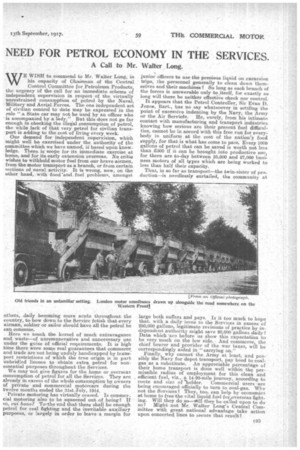NEED FOR PETROL ECONOMY IN THE SERVICES.
Page 15

If you've noticed an error in this article please click here to report it so we can fix it.
A Call to Mr. Walter Long.
WE WISH to commend to Mr. Walter Long, in his capacity of Chairman of the Central Control Committee for Petroleum Products, the urgency of the call for an immediate scheme of independent supervision in respect of the virtually unrestrained consumption of petrol by the Naval, Military and AerialForces. The one independent act of civilian control to date may be expressed in the rule " a State car may not be used by an officer who is accompanied by a lady." But this does not go far enough in checking the illegal consumption of petrol, the while lack of that very petrol for civilian transport is adding to the cost of living every week. Our demand for indepenalent supervision, which might well be exercised under the authority of the committee which we have named, is based upon knowledge. There is scope for its immediate exercise. at home, and for its early extension overseas. No entre washes to withhold motor fuel from our brave airmen, from the motor transport as a branch, or from. certain sections of naval activity. It is -wrong, now, on the other hand, with looranel_ fuel problems, amongst
others, daily becoming more acute throughout the country, to bow down to the Service fetish that every airman, soldier or sailor should have all the petrol he can consume.
Here we touch the kernel of much extravagance and waste—of unremunerative and unnecessary use under the guise of official requirements. It is high time there were some real guarantees that commerce and trade are not being unduly handicapped by transport ;restrictions of which the true origin is in part unbridled licence to obtain extra petrol for nonessential purposes throughout the Services.
We may not give figures for the home or overseas consumption of petrol for all the Services. They are already in excess of the whole consumption by owners of private and commercial motorcars during the twelve months ended the 31st Silly, 1914,
.Private motoring has virtually ceased_ Is commercial motoring also to be squeezed out of being? If so, cui bona? To.the end that there shall be enough petrol for real fighting and the inevitable auxiliary purposes, or largely in order to leave a margin for
junior officers to use the precious liquid on excursion trips, the personnel generally to clean down themselves and their machines ? So long as each brand' of the forces is answerable only to itself, for exactly so long will there Ise neither effective cheek nor control.
It appears that the Petrol Controller, Sir Evan I). Jones, Bart., has no say whatsoever in settling the point of excessive indenting by the Navy, the Army or the Air Servic&s. He, surely, from his intimate contact with manufacturing and transport industries knowing how serious are their present fuel difficulties, cannot be in accord withthis free run for everybody in uniform at the cost of the nation',s food supply, for that is what has come to pass. Every 1000 gallons of petrol that can be saved is worth not less than 2500 if it can be brought into productive use, for there are to-day between 25,000 and 27,000 business motors of all types which are being worked to less than half their capacity.
Thus, in so far as transport—the twin-sister of production—is needlessly curtailed, the community at large both suffers and pays. Is it too mach to hope that, with a daily issue to the Services in excess of 00 250,0 gallons, legitimate revisions of practice by independent authority might save 20,000 gallons daily? Data which 'are before us show this expectation to be very much on the low side. And commerce, the chief bearer and provider of the . war taxes, will be correspondingly aided in" carrying on." Finally, why cannot the Army at least, and possibly the Navy for depot transport, pay heed to coalgas as a substitute. An appreciable percentage of their home transport as done well within the permissible radius of employment for this clean and efficient fuel, viz., it 14-20-mile journey, according to route and size of holder. Commercial users are being encouraged officially to turn to coal-gas. Why not the Services ? They, too, can help by economies at home to free the vital liquid fuel f000verseas fighting. Will they do so—Will they be called upon to do so? Might not Mr. Walter Long's Central Committee with great national advantage take action upon concerted lines to secure that result?






















